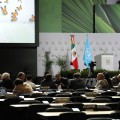All the Small Things: Day 5 at COP16
Tim Hall | December 5, 2010.
Technical details and legal and procedural complexities were the focus of Day 5. They also created biggest points of difference so far seen at COP16.
Negotiators continued updating texts, in preparation for their relevant governmental ministers arriving early next week. These texts under negotiation now will dominate discussion for the next week.
The ministers will then review and hopefully sign off on some constructive texts that will make significant progress towards action on climate change at COP17.
The continuation of Kyoto into a second period after 2012 was again under discussion, despite Japan and Saudi Arabia opposing any discussion on the matter.
They weren’t alone in being climate criminals today, with it being revealed that Canada had strongly been opposing Kyoto 2.0 behind closed doors. Canada was even accused of running a coordinated advocacy strategy to stall climate change policy in Europe and the US.
These tensions surrounding 2012 and beyond were exacerbated when a bloc of Leftist Latin American countries signalled they were being coerced into signing the Copenhagen Accord. They claimed other more developed nations would oppose any extension of Kyoto if the Accord wasn’t supported.
Some countries within the bloc, including Venezuela and Bolivia, were among the countries who last year blocked the non-binding climate accord presented at COP15 in Copenhagen.
The bloc, called ALBA, condemned the stance of countries such as Japan and Canada, claiming their policies were unacceptable and holding back progress at Cancun.
Tensions between developed and developing nations were again brought to the fore, and it seems will remain there until a compromise can be reached. We can only hope a compromise is under way for next week.
In informal meetings over COP long term vision, divergent views also emerged over some texts. Many countries stressed how hard to was to decide on which elements to agree on without knowing if the texts would be part of a legally-binding agreement. The reason for the building dialogue over legal form became clearer with these countries showing uncertainty over how to proceed without knowing what they’re proceeding towards.
In these meetings there was also some opposition to the wording ‘historical responsibility’, and growing talk over a ‘gap period’ after Kyoto, if no new treaty emerged and Kyoto wasn’t extended into a second period.
The weather seemed to reflect the mood of the day, with uncharacteristic cool winds and grey skies bringing Friday to an end. Although all these small details are important, it is also important not to get bogged down in debate on these points.
Compromise must be reached in order for progress to be made, and the big picture goal of binding and effective global action on climate change must not be lost when looking through the microscope.











comment